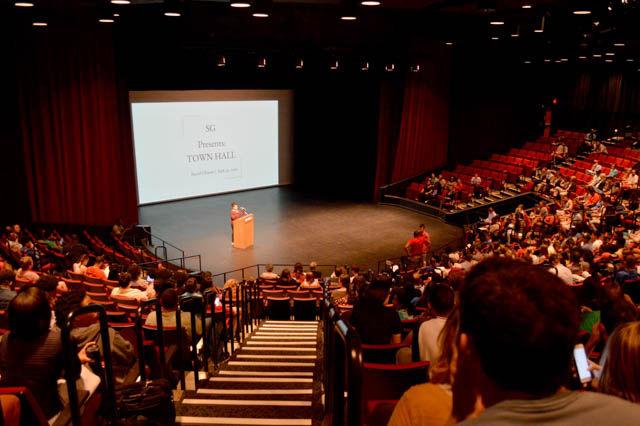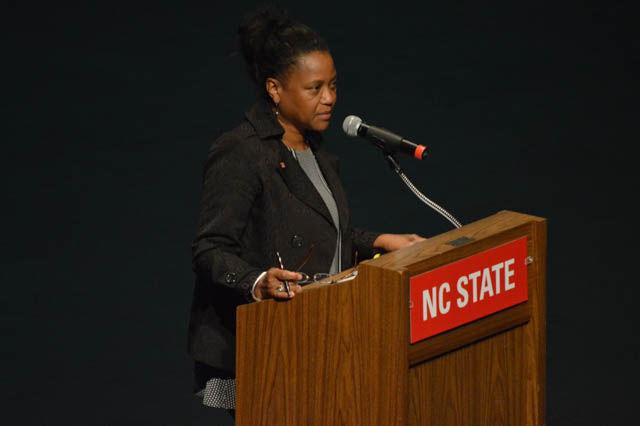Racist messages sent in private group chats, made public on Tuesday, were at the forefront of audience discussion at the Student Government Town Hall meeting held in Stewart Theatre on Thursday night.
Chancellor Randy Woodson articulated during the event’s open dialogue that the university was not able to take legal actions due to the students’ First Amendment rights, upholding what he said in a statement on Wednesday.
“I understand the implications of not holding people accountable for comments that are clearly racist, clearly bigoted and clearly derogatory and hurtful,” Woodson said. “… The bottom line is it didn’t rise to a level of a code of conduct issue, and people disagree with that, but that is the legal standing of the current interpretation of all of our federal and state.”
Following Woodson’s remarks, the audience rejected a suggestion that the Director of Student Conduct, Paul Cousins, speak about the legal implications of the message. Exclamations that open dialogue was meant for students followed, along with complaints that the chancellor was not looking at people of color when they were sharing their personal experiences.
Casting the forum as a legal conversation was a “subterfuge for what’s actually happening here,” according to Ashlyn Sanders, an alumnus of Duke and UNC-Chapel Hill and the sister of Robyn Sanders, a graduate student studying public administration.
“Their position coming in was from a legal perspective but that’s not what are students needed to hear, obviously by the tone of the room,” said Paul Nolan, student body president and a senior studying materials science and engineering. “I think it just exemplifies the problem, our administration isn’t talking to students about how they feel and what they need.”
Matthew Smith, a student in one of the group messages, “2020 Enginerds,” and a freshman studying engineering, attended the Town Hall meeting.
“I would like to get our side of the story,” Smith said. “To start, I don’t know what the assumptions are or anything about our group but in my experience with them we are not overtly racist.”
Some students were astonished by this comment, erupting into a chorus of “boos.”
“I don’t care about being overly racist, I don’t want to see racism at all,” said Cidni Ford, a senior studying psychology.
Jessica Peacock, a graduate student studying teaching, told Smith “we need to see those messages,” referring to the messages showing that the group was not “overtly racist.”
Many students disagreed with the administrative decision to not punish the authors of the messages. Instead, the two of the students involved in the messages issued a two-paragraph apology that was emailed to the student body.
“I did have the opportunity to read the letter and I thought what was most telling was that it was addressed just to the African-American community and I think it should have been addressed to the entire student body,” Sanders said.
Sanders also said that the authors of the messages still caused “intangible, emotional and psychological harm,” and “that his weapon of choice, while we may not be able to confiscate it, it has caused harm to students.”
Speeches from faculty members preceded the open discussion. The agenda for this section was created before recent incidents, according to Linda Smith, vice provost for Institutional Equity and Diversity.
“All student organizations will be required to participate in diversity and inclusion training, at least one member of the group,” said Deborah Felder, assistant director of student involvement. “Hopefully the president will participate in the training.”
Faculty and staff members will also have opportunities to participate in diversity inclusion trainings in addition to the Equal Employment and Opportunity training that all faculty and staff members are required to take within six months of employment, according to Beverly Williams, director of education and training.
One of the newest additions to a diversity and inclusion programs and initiatives is the Bias Incident Response Team (BIRT).
According to the presentation shown at the meeting, “the BIRT at NC State is a system through which members of the campus community can report incidents of bias and discrimination.”
However, BIRT is not intended to replace any other processes of reporting incidents of bias, harassment or violence.
Another key point of discussion was the General Education Program’s requirements pertaining to diversity.
“It has been a bit problematic for some time,” said Barbara Kirby, assistant vice provost for academic programs and services. “If something’s implemented in 2009, in 2016, for a lot of reasons, there’s probably a need to take a look and review those.”
A subcommittee of the Council on General Education and the Academic Policy Committee studied some of the issues related to the diversity requirement. Kirby claimed the findings of the subcommittee came at no surprise to students.
“There are insufficient numbers of available seats in U.S. Diversity courses,” Kirby said. “There’s also a lack of courses addressing all areas of diversity and inclusion such as religion, gender, ethnicity, race, class, sexual orientation and age.”
The Academic Programs and Services department of the Division of Academic and Student Affairs has three main options it is considering to address the diversity requirement.
“A mandatory diversity course for all students focused on diversity and cultural competency developed by a team of a faculty,” Kirby said. “Or it may be a diversity module, we are able to acquire from an outside vendor. Another option might be revision of existing courses by the various academic disciplines on the campus.”
“I don’t care about being overly racist, I don’t want to see racism at all.”
Linda Smith, the vice provost for Institutional Equity and Diversity, addresses Town Hall attendees. Smith said, "The agenda for this Town Hall was made before the recent incidents". An estimated 160 people were in attendance at the Racial Climate Town Hall in Stewart Theater on Thursday afternoon. The event was hosted by NC State Student Government.









